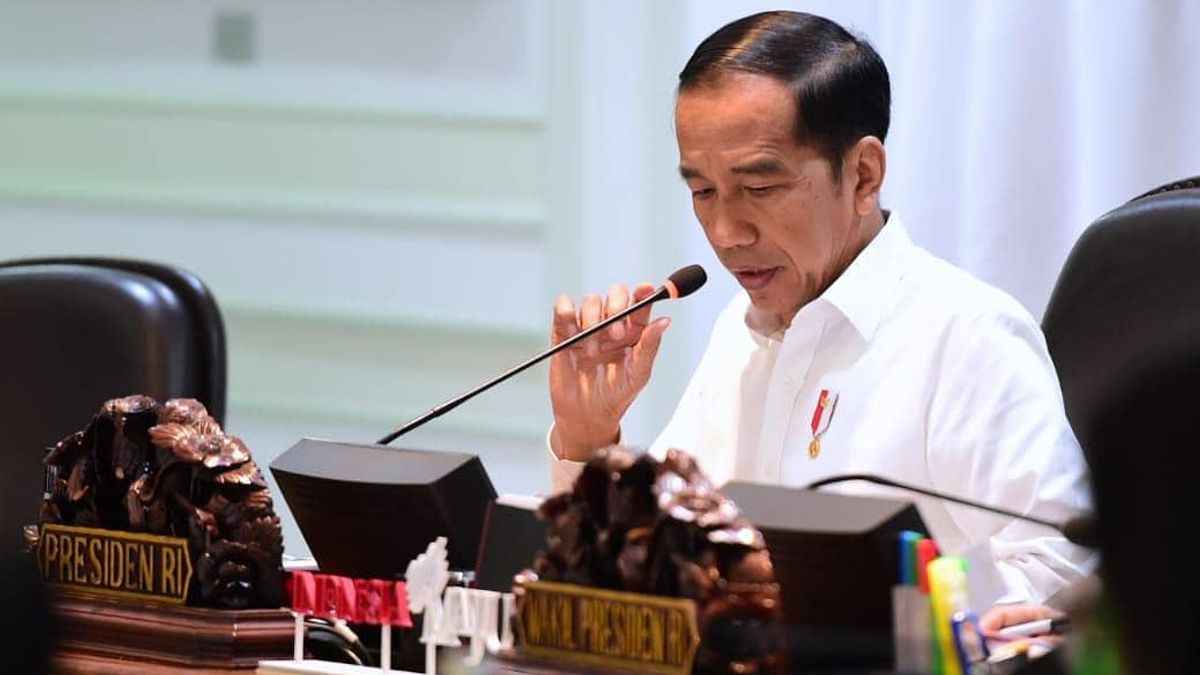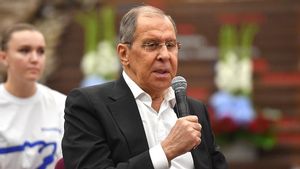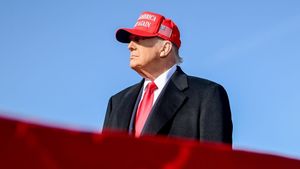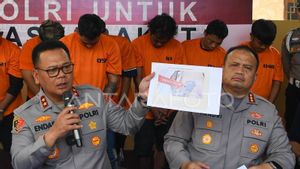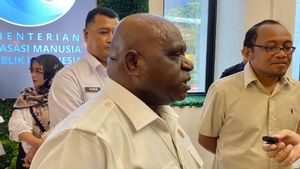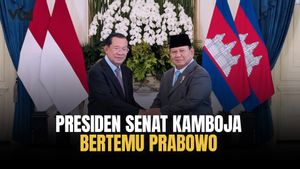JAKARTA - President Joko Widodo's commitment to solving human rights violations in Indonesia is being questioned. Because, in a special interview recorded by BBC Indonesia, Jokowi said that in his second term, he would focus on human resource development.
"In the first period I focused on infrastructure. The second period focused on human resource development, maybe after that the environment, innovation, then human rights. Yes, why not? Everything can't be done (all at once). It's not that I don't want to, but I really do. I like to focus on work, priority work, "Jokowi said in a video uploaded by BBC Indonesia, Wednesday, February 12.
As well as talking about human rights, the former governor of DKI Jakarta also spoke about intolerance in a diverse society. When asked by interviewers about intolerance that often occurs in society, Jokowi denied this by stating that Indonesian people are people who like to be tolerant.
"Indonesian society is also full of tolerance. Happy with democracy. Democracy and Islam also complement each other ... That there is intolerance, that there is such a thing as small conflicts, this is a large country that has diversity," said the former Mayor of Solo.
Jokowi could deny that human rights in Indonesia remain a priority, even though not for now. It's just that, the Chairman of the SETARA Institute for Democracy and Peace, Hendardi, actually views the opposite. According to him, human rights in Indonesia will go down a dark alley if judged by Jokowi's statement because investigating cases of human rights violations is not a priority.
In addition, putting human rights out of priority also illustrates that President Jokowi's government does not have a deeper understanding of human rights.
"Human rights are a paradigm of the state, not just cases or human rights violations. Jokowi should put human rights as a paradigm in infrastructure development, investment policies, strengthening human resources and other development agendas," Hendardi told VOI in his written statement, Sunday night, February 16.
According to this activist, if the government succeeds in understanding the broad meaning of human rights, the synergy between human beings and development will continue. "The human rights agenda can be integrated into all government performance," he said.
Hendardi also regretted Jokowi's statement in the special interview. According to him, a president should not choose which tasks are more important and which ones can be done later.
According to him, as a state leader, it is Jokowi's job to ensure his people are prosperous, protected, ensure that their people get justice, resolve cases including cases of human rights violations, and ensure equality in religion or belief.
So, to complete this task, President Jokowi then has the authority to appoint ministers and ministerial level officials to assist him. However, Hendardi did not deny that in order to complete all these tasks, Jokowi's assistants would have to be competent in carrying out their duties.
If they are capable, then, there will be no more reason for the government to delay the tasks they have to complete, including resolving cases of human rights violations and intolerance, which are the government's agenda that has been listed in Nawa Cita for the 2014-2019 period, but it is delayed and unclear. the solution.
Bullets to solve cases of human rights violations
Regarding the settlement of cases of human rights violations, Hendardi said that Jokowi actually already had the bullets to solve them. The bullet he touched on was the idea of establishing a Presidential Committee for Truth-Telling as stated in the 2014-2019 Nawa Cita.
This committee - which is currently in the form of a draft law (RUU) on the Truth and Reconciliation Commission (KKR) - is considered to be a middle way to pioneering the settlement of past human rights violations. This is because this commission is to reveal the truth, without being trapped in a judicial or non-judicial settlement.
"If this commission is finished carrying out its task of exposing the truth, the next step is to discuss the meaning and ways of justice which can have many variants," said Hendardi.
However, in this second term, President Jokowi seems to have lost his interest in resolving cases of past and current human rights violations. In fact, this is the last period he served as number one.
"Jokowi actually abandoned his intention in the second period, on the grounds that his leadership priorities were the advancement of economy-welfare and strengthening of human resources. Then when will the promise to complete the human rights field be fulfilled? Meanwhile, Jokowi has entered his second period," he said.
Not capable of dealing with intolerance
Hendardi not only commented on Jokowi's statement that he considered human rights not a priority but also commented on intolerance in society.
Although President Jokowi said that Indonesian society is a tolerant society and it is natural that there is a little act of intolerance, Hendardi believes that this statement is proof that the state no longer knows what to do with intolerance in society.
"It seems that Jokowi's commitment is only intended to justify his political actions in appointing a number of ministers whom Jokowi deems to be capable of handling intolerance," said Hendardi.
Indeed, in recent times, cases of intolerance in society have occurred rapidly. One example is the polemic of the construction of the Catholic Church of Santo Joseph Tanjung Balai, Karimun, Riau Islands, which was busy on social media some time ago. It is known that the polemic for the construction of the church had actually occurred since 2013.
Later, a mass action had also occurred at the laying of the first stone for the renovation of the church on October 25, 2019 and in the aftermath, the construction of the church had to be stopped because the issuance of the building permit was sued by a group of local residents.
The Coordinating Minister for Political, Legal and Security Affairs (Menkopolhukam) Mahfud MD claimed that this case had been resolved jointly between the church and other parties, such as the local government and the local Muslim forum in front of the Minister of Religion but this kind of case actually impresses the government is still not have a surefire way of dealing with intolerance.
Regarding the polemic of church construction in Karimun, Mahfud denied that there were acts of intolerance committed by certain religious groups and said the polemic only occurred on social media.
Reflecting on this, Hendardi assessed that many ministers or government officials have no way of dealing with intolerance in society.
"In fact, a number of ministers and heads of agencies or institutions do not have a unified and fundamental agenda in dealing with intolerance," he said, adding that violations of freedom of religion or belief continued and at the same time were denied by elements of the state.
So, with a long lead time until 2024, the Jokowi-Ma'ruf Amin government has time to prove their promises, including issues of human rights and resolving intolerance in society.
"Jokowi still has time and must answer the hopes of the public who will faithfully provide support in period II and believe that the promise of resolving human rights violations and intolerance will be fulfilled in this second period," he concluded.
The English, Chinese, Japanese, Arabic, and French versions are automatically generated by the AI. So there may still be inaccuracies in translating, please always see Indonesian as our main language. (system supported by DigitalSiber.id)
